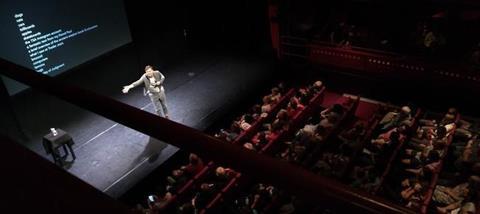
Why do you think we need a reminder of what joy is?
Because for many people, they've been drowning in positive messages about "happy". And "happy" often exists in a binary, it's a duality - there's happiness and sadness, there's positive thinking and negative thinking. You're either on this side or that side. But joy wraps its arms around the entirety of the human experience.
We've always needed joy. It's like oxygen. This is as basic as it gets. It's not something you add on to life, once you've taken care of the important stuff. It is the important stuff.
You talked in the in the show tonight about your own personal experience about being a pastor and how hard it was at times to live with that duality.
Yeah and a lot of this was shaped out of my early years as a pastor doing funerals.
I remember I was getting ready to do a wedding and the fiance was killed by a piece of equipment at work. I went over to the bride's house and her family were rushing over there, because everyone had just heard they hadn't been able to revive him. I had a front row seat to anguish and suffering. And I thought, "I don't know how to make sense of this."
What was so interesting was stumbling into this ancient alternative wisdom tradition. A lot of modern people get tied up in knots over it, because they try and read it like you would read self help: "Here's how to get happy." And I say "No, no, here's how to get so sad that you might actually find joy!" There's a certain subversion to it, if you can tune into it, and it changes your life.
The brilliance of Ecclesiastes is: however bad you think it is, it's worse. Your starting point is "oh, my word, we're all gonna die, maybe soon." And if you can accept that, now you actually have a shot at joy. Look at this wonderful gift of life! The poet Rocha said "to be here is glorious." And for many people, they're overwhelmed with the sorrow and the very real sufferings of the world. Life is so fragile. It's so temporary. The Hebrew word for it in Ecclesiastes is "vapor" - you're here, and then you're gone.
A lot of people say "just try really, really hard to have a happy life" but they end up more miserable than ever! Think about England and America - some of these capitalist ideas about "just get a bunch of stuff. Be healthy, and accumulate some nice things and avoid some bad things, then you'll be happy." People follow that, and they're more miserable than ever! So you have this ancient tradition that says "No, no, go about it totally differently. Go into the heart of all the sadness, and the anxiety and the loss, go all the way into it. And on the other side, you might actually find something."
The reason why suffering is so painful is because it's making you more acutely aware of how sacred and precious this gift is. The reason why it hurts so much is because it's so valuable. It's the most valuable thing imaginable. It's alerting you to look at how precious this is.
How can people get into this mindset? How can we retrain our minds?
Well, for many people, joy is, "If I could just get my life all cleaned up, and get to the top of the mountain, I could just escape all of the grit and sweat and grime of life, the bills, the problems, the annoying co-workers, the obnoxious neighbors." But joy is about your eyes opening to the absurdity, to the funny, to the unexpected surprises, to the creativity. It's right below the surface everywhere. You don't need to go to the top of the mountain.
So you show up at work. And that strange coworker goes on about how much they love tuna salad. And you think, "This person exists. Look at them." And you delight in that. It's like you have a whole new lens for everything. Lean into the absurdity because God is there.
Over the past few years it's been up and down for you as the public reaction to your work has been mixed. Has understanding joy helped you?
Oh, absolutely. You can't control the outcomes. And for many people, that's the lie of the modern age - that you can control the whole thing.
Instead, you give your joyous, biggest, most generous gift to the world. That's what you can control. And you just give it with a smile. You give it everything you have - you throw yourself into it. That's where the joy is.
Yeah, to me, I have more wonder and awe than ever. I can't believe I get to do this.
For more information about An Introduction to Joy, visit robbell.com



























